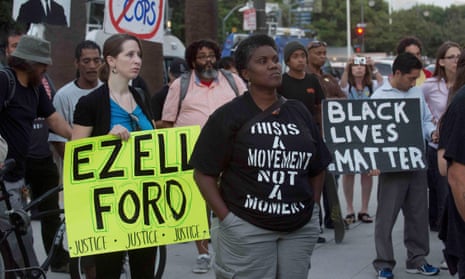Members of the Black Lives Matter movement have disavowed all political parties after the Democratic establishment adopted a resolution in support of the movement, which has interrupted the party’s frontrunners at several campaign events in recent months.
The Democratic National Committee (DNC) unanimously adopted a resolution in solidarity with the Black Lives Matter movement on Friday afternoon during a summer meeting in Minneapolis.
The resolution, which was first reported by Buzzfeed, said: “The DNC joins with Americans across the country in affirming ‘Black lives matter’ and the ‘say her name’ efforts to make visible the pain of our fellow and sister Americans as they condemn extrajudicial killings of unarmed African American men, women and children.”
The Black Lives Matter network, which spans 26 chapters nationwide, responded by clarifying that the organization remains unaffiliated with any political party.
“We do not now, nor have we ever, endorsed or affiliated with the Democratic Party, or with any party,” the Black Lives Matter network said in a response posted to its Facebook page on Sunday. “The Democratic Party, like the Republican and all political parties, have historically attempted to control or contain black people’s efforts to liberate ourselves. True change requires real struggle, and that struggle will be in the streets and led by the people, not by a political party.”
In the resolution, the DNC called on Congress to pass laws that seek to reform the criminal justice system, end racial profiling, demilitarize police forces and support programs that offer alternatives to jail time. The proposals are in step with those outlined last week by a coalition of civil rights protesters.
The resolution names the three women credited with founding the Black Lives Matter movement, stating: “We hear the ‘Black lives matter’ cry from the inspiration of creators Patrisse Cullors, Opal Tometi, and Alicia Garza, and from the heart of a generation of young African Americans who feel totally dismissed and unheard as they are crushed between unlawful street violence and unjust police violence.”
The BLM movement began as a hashtag on Facebook, born from the angerCullors, Tometi and Garza felt after George Zimmerman was acquitted of murder over the killing of Trayvon Martin in Florida.
The founders harnessed social media to expand the movement during the street protests and rallies that followed the killing of Michael Brown, an unarmed teenager shot dead in Ferguson, Missouri.
Activists affiliated with the sprawling network of BLM chapters have sought to advance their message by raising their voices at campaign appearances by presidential candidates including Bernie Sanders, Martin O’Malley and Hillary Clinton. Their collective actions have succeeded in pushing police and criminal justice reform to the forefront of the race for the Democratic nomination.
Last month, Sanders surrendered his microphone to activists in Seattle, an episode that sparked a debate on progressivism and race. Republican frontrunner Donald Trump said of the episode: “I would never give up my microphone; I thought that was disgusting.”
Clinton had a tense but frank conversation with a small group of Black Lives Matter protesters who had planned to disrupt her campaign event in New Hampshire last month but arrived after the secret service had shut the doors.
And the Republican governor of Wisconsin, Scott Walker, has dismissed the idea that he would sit down with representatives of the movement, and Senator Rand Paul advised the group to change its name.
According to BLM’s statement, the movement remains largely unimpressed by all the candidates.
“Resolutions without concrete change are just business as usual. Promises are not policies. We demand freedom for Black bodies, justice for Black lives, safety for Black communities, and rights for Black people. We demand action, not words, from those who purport to stand with us,” BLM said.
“While the Black Lives Matter Network applauds political change towards making the world safer for black life, our only endorsement goes to the protest movement we’ve built together with black people nationwide – not the self-interested candidates, parties, or political machine seeking our vote.”

Comments (…)
Sign in or create your Guardian account to join the discussion